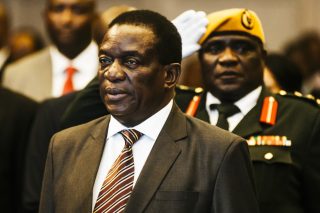On Tuesday, Zimbabwe was accused of understating its financial records, after the release of budget figures last week. The report showed that major ally, Beijing ranked poorly on the list of Harare’s foreign donors.
Zimbabwe’s Finance Minister Mthuli Ncube said in a budget statement on Thursday that the country received $194m from bilateral donors between January and September, with the bulk money coming from Western countries.
He further stated that China provided $3.6m, a figure that was criticized as paltry by opponents of Mnangagwa’s government, which considers Beijing an “all-weather friend.”
The Chinese embassy in Harare disputed the figure, saying in a statement that the figures were very different from the situation on the ground. It further said its records showed that bilateral financial support to Zimbabwe was far greater, at $136.8m between January and September, excluding donations to vulnerable groups.
“The embassy wishes that the relevant departments of the Zimbabwean government will make comprehensive assessments on the statistics of bilateral supports and accurately reflect its actual situation when formulating budget statement,” the embassy said in a statement.
Zimbabwe faces its worst economic crisis in a decade, a situation which has been exacerbated by severe drought. Rolling power cuts and shortages of foreign exchange, fuel and medicines have made life unbearable for its people.
According to the International Monetary Fund (IMF), Zimbabwe’s annual inflation rate hit 300 percent in August, making it the highest in the world.
Wages have stagnated while prices of basic necessities like food and fuel have soared four times higher. There is a shortage of cash which has been a problem for years and have worsened over time. A majority of the doctors and health workers have been sacked, with no food.
Also, as a result of the sanctions placed on Zimbabwe, the country has not been able to access funds from foreign bodies like the International Monetary Fund(IMF) and the World Bank. This is because financial institutions want Zimbabwe to implement significant fiscal and structural reforms before granting loans.
Zimbabwe’s authorities have a history of quietly racking up foreign debt without the approval of parliament. The lack of transparency in government is one of the reasons Zimbabwe was sanctioned by the United States.
But despite all of this, China has been a major financier of projects in Zimbabwe, including water and power infrastructure through the China Export and Import Bank.
This latest funding discrepancy has raised a lot of questions about whether the real figures are being hidden or if this is an accounting error. And considering China is Zimbabwe’s major donor, it would be beneficial for the country to be more transparent and accountable in its record-keeping or risk losing the Asian country’s support.
By Faith Ikade.








